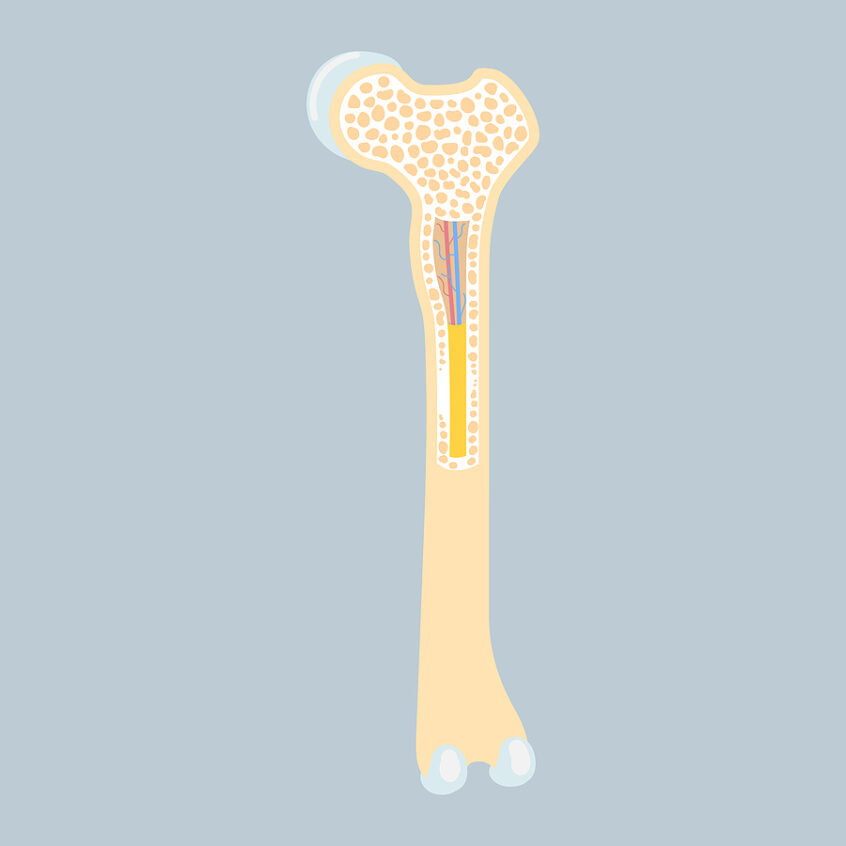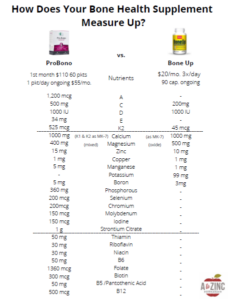Get started early with bone health interventions.
I’ve known for most of my adult life, that I have at least two of the major risk factors for getting osteoporosis: being underweight and Caucasian. Then, recently I discovered another risk factor through genomic testing: a genetic predisposition to vitamin D deficiency. And sure enough, when tested, my vitamin D levels were lower than optimal even though I spend a lot of time outdoors. Additionally, I recently entered menopause, which reduces estrogen (a bone supporting hormone) and – BOOM – I added the last major risk factor for getting osteoporosis to the list.
Needless to say, bone density screening has been on my radar for the past few years. If left unmanaged, eventually these risk factors could lead to osteoporosis. I shared all of this with my doctor when she declined my initial request for a DEXA scan. She explained that DEXA scans aren’t typically covered by insurance until the age of 65.
So, I appealed from a different angle: I’m active. Hiking, biking, running, in-line skating, etc. etc. all carry a risk of injury. If I get hurt at my age, recovery is difficult and may require me to be sedentary even temporarily, which will worsen any bone density loss I may have. So why not find out now, rather than waiting 14 years when it may be too late to halt or reverse any bone loss?
She finally agreed to place an order for a scan.
DEXA scan results were positive for bone density loss.
While I’m not excited to see that I have the beginning stages of bone density loss, I am grateful to understand my current bone health. Now I have information to guide me in taking measures to slow the loss and I can be more conscientious about safety precautions while engaging in activities. I’ll need to invest in a set of knee and elbow pads for sure! No more in-line skating without protection.
The other good news is that now that I have evidence of some bone loss, I am insurance-approved to get an updated scan every 3 years. This is important to understand the rate at which my bone loss progresses. I can assess the effectiveness of my interventions. This first test also becomes a baseline for future medical decisions. Many providers recommend medications that would try to achieve the bone density of a woman in her 20’s and 30’s. That’s not realistic.
Lifestyle interventions first.
I can’t change the fact that I’m aging but there are a number of things within my control that I can do to support bone health. I already practice a few such as eating a healthy diet, rich in whole foods with lots of fruits and vegetables, and regular exercise. Vegetables are truly the best source of calcium and eating a lot of plants helps keep inflammation down; osteoporosis is inflammation in the bones. I exercise several times each week. I enjoy a mix of running, biking, yoga, aerobic workouts, and strength training. Some are better for bone health than others, but they all help. I also see a chiropractor on a weekly basis and take a vitamin D supplement.
Unfortunately, I also do a few things that hurt my bone health: I drink coffee nearly daily, and I have an occasional alcoholic beverage on the weekends. Both have a strong negative impact on bone health. I’m probably not going to cut these things out of my life completely, but I clearly need to cut back as much as is reasonable. Sad, but necessary.
Add calcium safely and correctly.
As expected, the advice my doctor gave me as part of my DEXA scan follow up was to start taking calcium. Sigh…there is so much more to it than that.
Supplemental calcium given incorrectly can cause more harm than good. Calcium from our diets is readily absorbed and either used by the cells or stored in our bones; supplemental calcium rarely gets deposited in our bones. It’s more likely to get deposited in our arteries. Yikes! That’s a recipe for coronary artery disease.
When given in low doses, in the best absorbed form, and with other key supporting nutrients, supplemental calcium is more likely to be bone health supportive and less likely to increase the risk of heart disease. I’ve avoided taking calcium for years despite all the doctors that told me I should take it because of my obvious risk factors, but now I need to.
A comparison of two bone health supplements.
After much searching through professional products, I found a comprehensive bone health supplement that has research to show it may work to stabilize bone density levels and it may even improve bone density. It’s one I recommend to my patients, and it’s the one I’ve started taking. It’s got an appropriate dose of calcium and all of the minerals that work WITH calcium for optimal absorption and utilization. Plus, it also has a good list of other supporting nutrients such as the B-complex vitamins and antioxidants.
Initially, it may seem expensive to use this supplement. But if I don’t have to take my other supplements because this one is quite complete, it will save me money and it will be more convenient. You can see from the other bone health supplement label that it doesn’t have the extras. It’s a good supplement because it has the nutrients that are most critical to pair with calcium, but most people, including me, would have to add a few other supplements to meet their needs.
If you are taking calcium, consider getting more information to see if what you are taking is helping or hurting. If you are taking a comprehensive bone health supplement, take some time to compare a few labels and see if you are getting what you really need.
One last bit of advice.
Be an advocate for your own bone health. Ask for a DEXA scan early. Don’t wait until it’s too late or you are injured and discover bone density loss incidentally. A lot can be done early to support bone health. Furthermore, taking a calcium supplement without understanding it isn’t a good idea.
A to Zinc Nutrition specializes in reducing inflammation with foods and nutrients unique to individuals. Genomic testing can reveal your genetic predisposition, and lab testing can help us understand the status of your vitamin D levels along with many other nutrients. We then create a bone health plan specific to you.
Kari Collett, RDN, LDN, CLT with A to Zinc Nutrition, LLC
To learn more about optimizing your bone health, schedule a free Discovery Call: https://atozincnutrition.com/schedule/


